SingaporeMotherhood | Baby & Toddler
May 2025
10 Truths about Baby Swimming Lessons (+ Best Places to Learn)

Athanasius Pang, now better known as Coach Athan, is making waves in baby swimming lessons with his unique approach. Watching him gently handling infants, you would never guess that this 50-year-old once stood guard over presidents and prime ministers. Today, he channels his life experiences — including navigating personal and professional challenges — into creating Dip Swim.
More than just another swim school, Dip Swim is built on the foundation of instilling resilience and emotional well-being in children, alongside crucial water safety skills. As a father himself, Coach Athan is passionate about equipping children with essential life skills both in and out of the water. Taking a breather between lessons, he took time to wade through all our baby swimming questions.
(See also: 10 Life Lessons I Want My Kids to Learn from Joseph Schooling)
1. What are the benefits of learning to swim from a young age?
Baby swimming lessons offer a number of benefits in four key areas:
- Physical Development
- Improve motor skills: Swimming helps babies develop gross motor skills, including coordination, balance, and strength.
- Enhance muscle development: The water’s resistance helps babies build muscle strength and endurance.
- Increase cardiovascular fitness: Swimming is a great way to get babies’ hearts and lungs working.
- Cognitive Development
- Build problem-solving skills: Swimming requires babies to think about how to move their bodies in a new environment.
- Increase confidence and independence: As babies become more comfortable in the water, they gain confidence and a sense of independence.
- Sensory stimulation: The water offers a rich, multi-sensory environment that helps engage babies’ developing senses.
- Social Development
- Encourage bonding with parents: Baby swimming lessons provide opportunities for parents and babies to connect.
- Opportunities for social interaction: Group lessons allow babies to interact with other children and learn social skills.
- Water Safety
- Reduce risk of drowning: While swimming lessons don’t prevent drowning altogether, they can help babies develop skills that increase their chances of survival.
- Promote water safety awareness: Babies learn about water safety and how to be safe around water.
2. At what age can babies start learning how to swim?

Healthy babies can start learning to swim at any time. For formal training with drills, it is advisable to begin when babies can hold their head up independently. This usually happens around three months old.
3. What are the advantages of starting so early?
- The younger you start baby swimming lessons, the more likely they are to become comfortable in the water. This can make learning formal swimming easier later on.
- Since swimming promotes physical, cognitive, and social development, why not give baby a head start in these areas?
- While not a guarantee, early lessons can help babies develop skills that could increase their chances of survival in a water incident.
Overall, early swimming lessons can be a valuable investment for your child. However, remember that safety and the swim company you engage should always be the top priority.
4. But isn’t three months just too young?
Is there really a ‘right time’ to receive aquatic education and begin bonding with water? Would you say a baby is too young to start learning to speak, walk, play, draw, or write? The fact is, it comes down to parental perception. Once put into perspective, this question would not exist. Besides, babies spend their first nine months doing laps in amniotic fluid!
(See also: 8 Ways to Boost your Baby’s Speech and Language Skills)
5. Is it true that all babies can float?
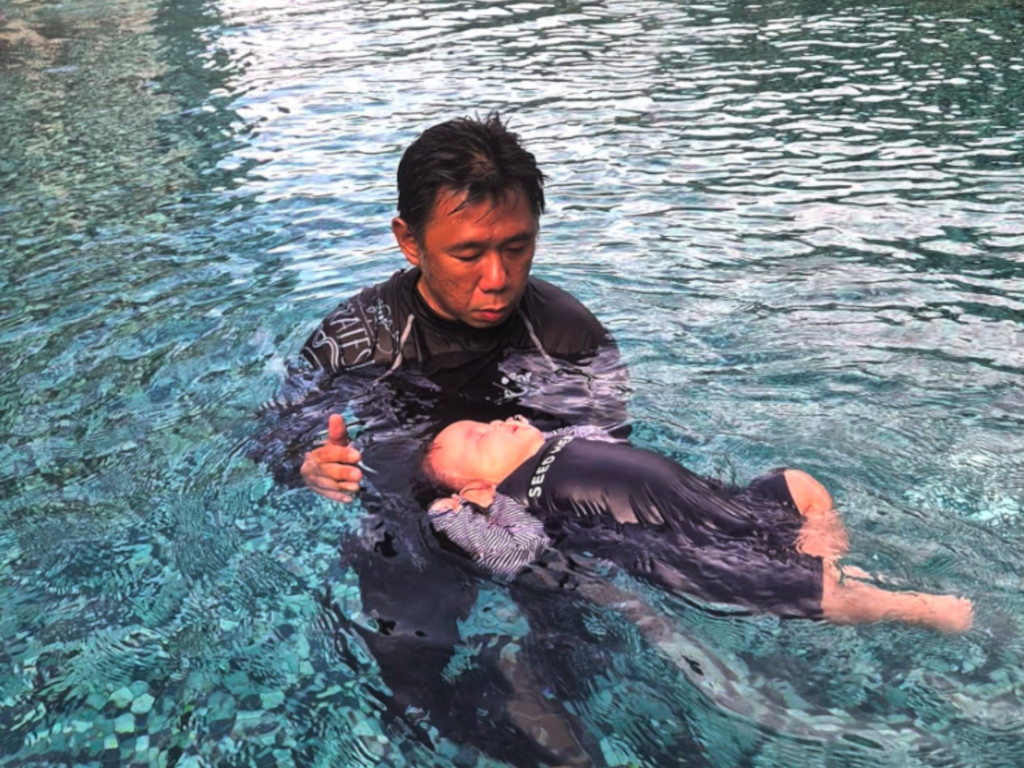
This is a myth. While babies do have a higher percentage of body fat than adults, which makes them more buoyant, it doesn’t mean they’ll automatically float. Their weight and body composition can vary, and they might sink without support.
6. If my baby learns how to swim, but I don’t take them swimming regularly, will they forget how?
It’s true that swimming skills can regress if they’re not practised regularly. However, if the coaching methodology was on track, they’ll still enjoy innate water comfort and confidence. This, as well as muscle memory, makes it easier to relearn swimming skills too.
7. So how do you teach a baby to swim?
At Dip Swim, we employ a gradual process that emphasises building comfort and confidence in the water. Do note that this is a general guideline. The specific steps and pace will vary depending on the baby’s individual development and (parents’) comfort level.
- Pool-breaking
- Start with small talk and lots of smiles to put baby at ease.
- Focus on letting baby acclimatise to the water. Have them splash with legs and hands, sticking out their tongue to taste the water, and get comfortable with the sensation and temperature of the water.
- Be nice but firm. Use a calm, encouraging voice and actions to help baby feel safe and secure. Offer a million-dollar smile after each drill, but do not let cries and whines take you hostage.
- Floating on the Back (The most basic survival technique during water incidents)
- Support baby’s shoulders face up, while singing “Twinkle Twinkle Little Star”.
- Gradually increase the duration they spend floating as they become more comfortable.
- Basic Swimming Movements
- Glide – As baby becomes more comfortable, gradually reduce your support.
- Kick – Support baby’s body and encourage them to kick their legs.
- Arm movements – Help them move their arms in a circular motion.
- Combine movements – Gradually combine kicking and arm movements.
- Independent Movement
- Encourage baby to explore the water independently.
- Provide support and guidance, offering encouragement and assistance as needed.
8. Are the methods different if my child is already a toddler or preschooler?
That’s right, the approach changes as the child gets older. While the core principles of building water comfort and confidence remain the same, we adjust the methods for age.
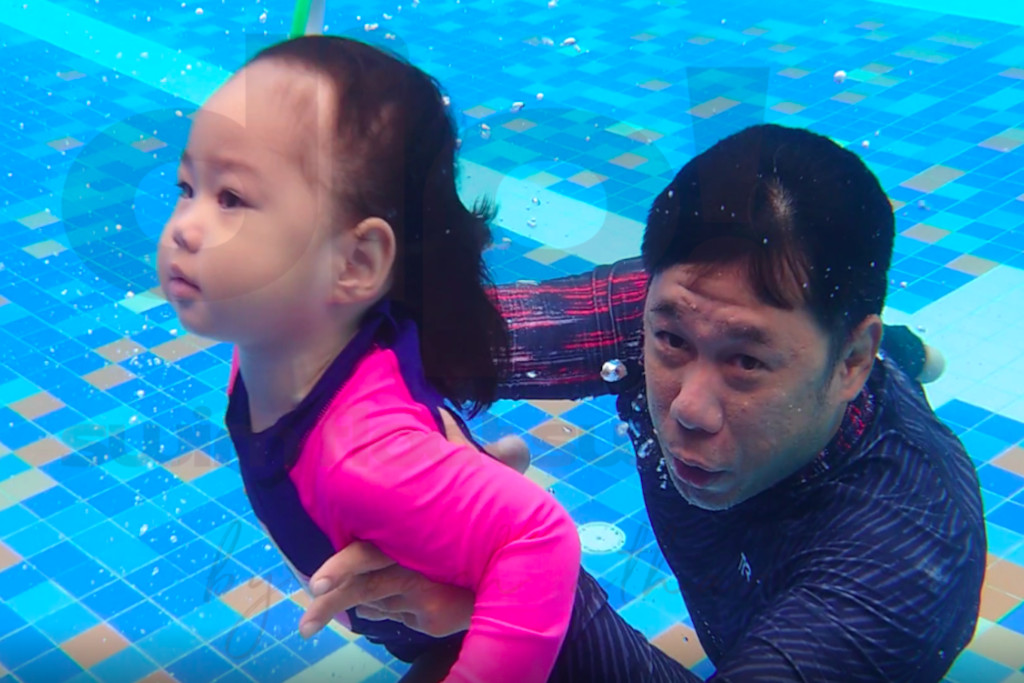
- Toddlers (1-3 years)
- Toddlers are more active and eager to explore, so we can involve them more in the learning process. Give simple instructions (do not ‘ask for permission’) and allow them space to explore and bond with the water.
- Engage them with fun water games like ‘kick the water, ‘splash water on mummy’, or ‘catch the toy’. Then introduce basic skills like kicking, arm movements, floating, and holding their breath.
- Keep the lessons short, sometimes playful. Most importantly, always end the lesson with smiles; don’t leave tears behind.
- Preschoolers (3-5 years)
- Preschoolers can start to learn more independently and often thrive in more structured lessons. Start with water safety rules, making sure they understand the importance of staying within arm’s reach and listening to instructions.
- Introduce basic swimming strokes and encourage participation. Let them help throw toys and select games and activities to develop self-esteem and independence.
- Celebrate progress. Praise their efforts and celebrate their achievements to build their confidence.
Remember, every child develops at their own pace. Be patient, encouraging, and focus on making swimming an essential and positive experience for your child.
(See also: Raising Olympic Champions: A Guide for Parents)
9. What makes Dip Swim different from other swimming schools?
At Dip Swim, we believe in nurturing the whole child. Beyond teaching essential swimming skills, our swim programme cultivates emotional resilience, self-belief, and perseverance. We create a supportive environment where children feel valued, safe, and empowered.
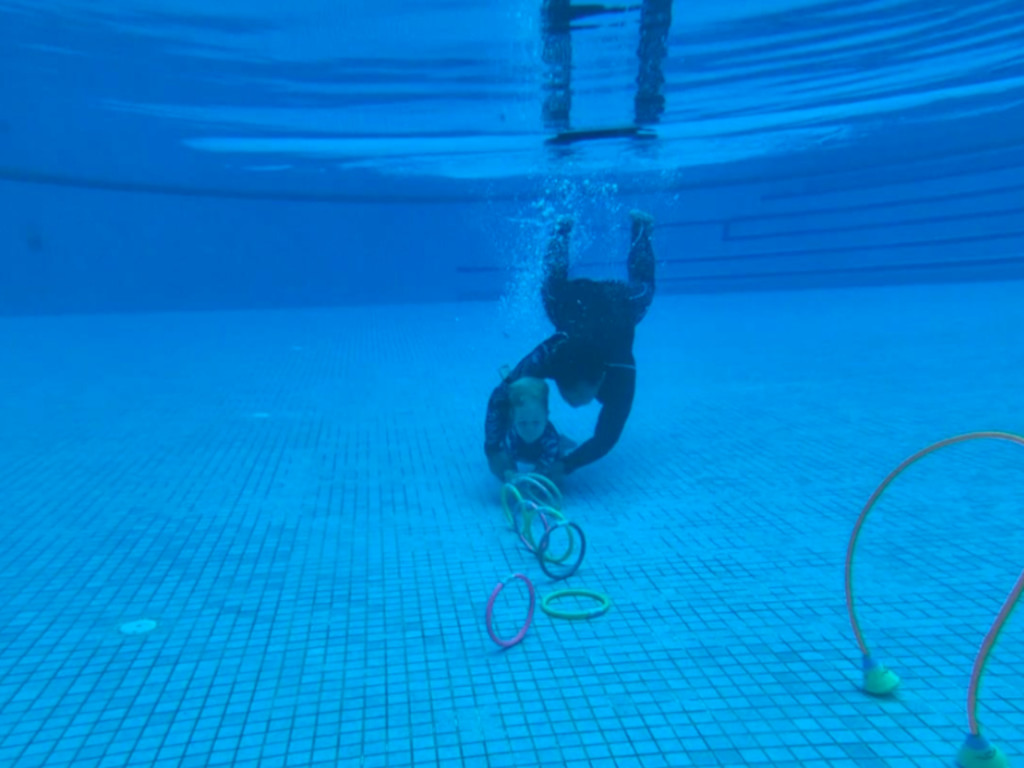
Our proprietary curriculum integrates mental and physical development, emphasising both water safety and survival skills. Children gain crucial life skills, such as how to handle unexpected situations confidently. While we don’t explicitly teach anatomy or physiology, the programme fosters self-awareness and problem-solving skills through age-appropriate challenges and positive reinforcement. We also work closely with parents to help them understand their child’s progress and unlock their potential.
What sets Dip Swim apart is our focus on character development alongside swimming proficiency. Children gain confidence, respect for authority, patience, and problem-solving abilities — skills transferable far beyond the pool. This holistic development ensures children leave Dip Swim not only strong swimmers, but also confident, resilient leaders.
10. Any advice for parents who want to try teaching their own baby to swim?
- Remember, safety first. Never leave your baby unattended near water, not even for a moment. Drowning can happen quickly and silently. Start in the baby pool if you’re not confident in handling baby in the water.
- Have a plan. Know what you’ll do if your baby gets into trouble. At the very least, stay calm. If a parent tends to panic when their baby chokes on water, I suggest leaving the training to a professional.
- To build water comfort, start with short, fun sessions where baby can splash, play with toys, and get used to the feeling of the water. Use a calm and encouraging voice, praising baby for their efforts.
- Follow baby’s lead and don’t force them if they seem scared or uncomfortable. Instead, stop and try again later, so as to not risk cultivating water phobia. There are ways to follow through, which require professional training.
- My best advice is to consider baby swimming lessons. Professional guidance is only a few clicks away. While parents can teach their baby some basic skills, a qualified instructor provides more comprehensive instruction and safety guidance. (Or sign up with Dip Swim’s Coach-the-Coach Masterclass before you start!)
Finally, savour the process. Learning takes time, so don’t get discouraged if baby doesn’t progress as quickly as you expected. Just keep practising and having fun. Baby swimming lessons can be a wonderful way to bond with your baby and create lasting memories. Enjoy!
More Baby Swimming Lessons in Singapore
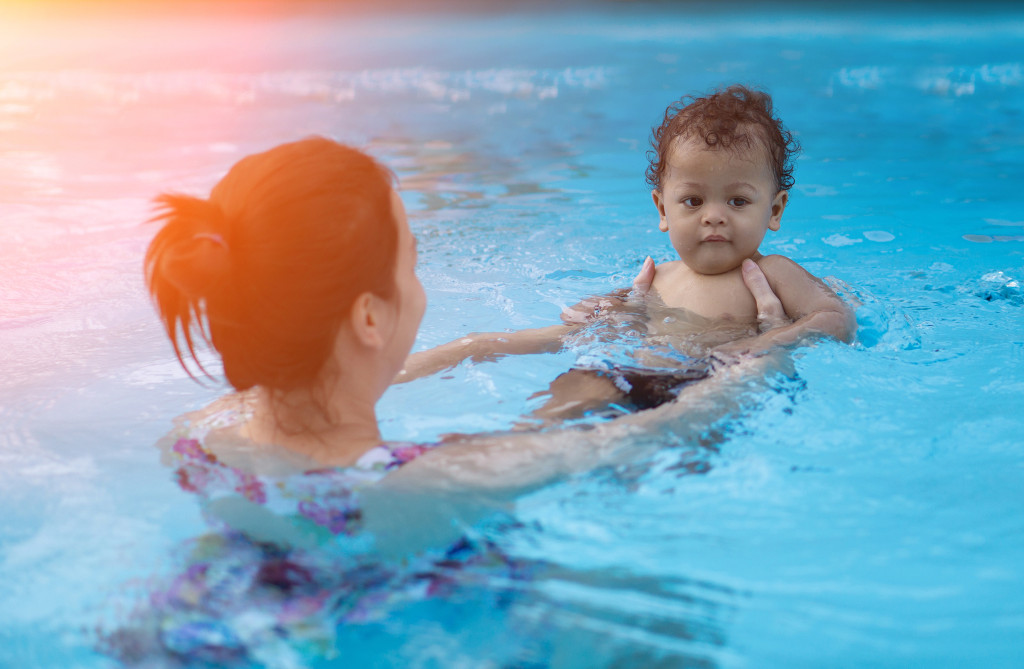
ABLE Aquatic School
Group lessons following the SwimSafer programme at over 20 swimming complexes around Singapore. Discover results-driven swimming lessons at swim.com.sg.
aquaDucks
Infant and children swim lessons in all-weather facilities in Queenstown, Pasir Panjang, Normanton, and Mountbatten. Learn swimming through play at aquaducks.com.sg.
Happy Fish Swim School
With 10 indoor swimming complexes islandwide, babies, children, and even grown-ups can learn to swim in heated pools. Pick a location near you at happyfish.sg.
Inspire Mum & Baby
This holistic centre for pregnancy and birth is also a pioneer in Singapore for infant swimming. Swim classes also extend to special needs children at inspiremumbaby.com.
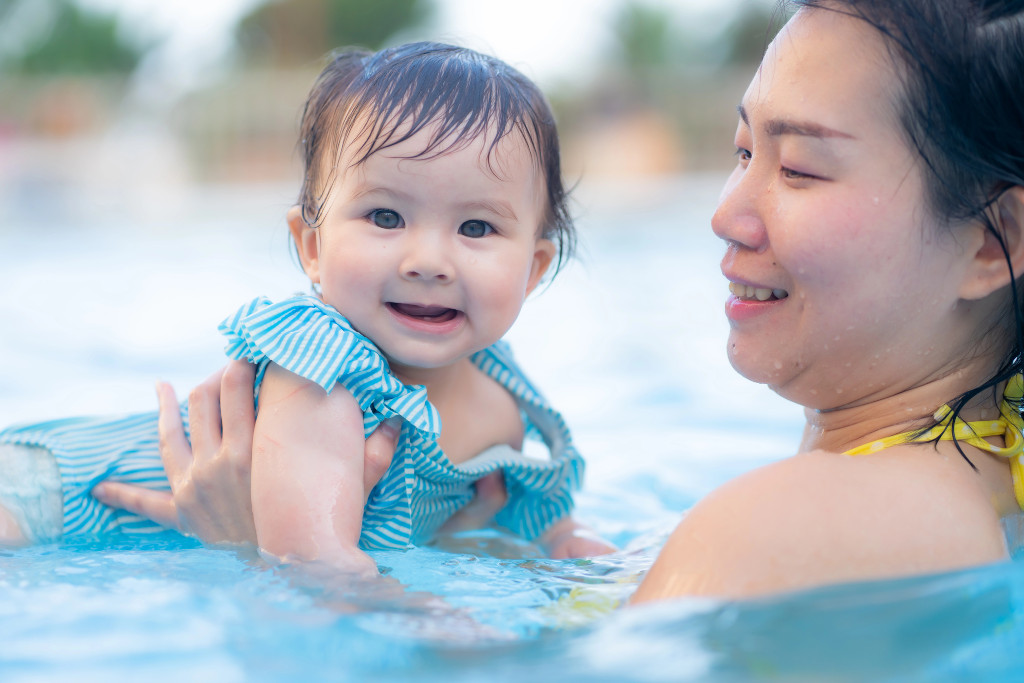
Little Splashes Aquatics
From a tiny swim school at Siglap Community Centre in 2015 to seven indoor heated pools across Singapore today. Learn swimming through song and games at littlesplashes.com.sg.
Red Dot Penguins Swim School
This social enterprise is a family-oriented swim school with a world-class programme. Explore locations in Orchard, Toa Payoh, Bukit Merah, and Siglap at reddotpenguins.com.
State Swim
Baby swimming lessons at convenient locations in Suntec City and Aljunied. Learn more about the leading swimming programme in Australia and Singapore at stateswim.com.sg.
SWISH! Swimming
Singapore’s only dedicated indoor and outdoor swim school in Dempsey Hill tailors swimming classes for children from 4 months old. Sign up at swishswimming.com.
(See also: Groom Your Future Olympian at These Top Sports Academies for Kids)
Images courtesy of Coach Athan and Dip Swim, unless otherwise stated
All content from this article, including images, cannot be reproduced without credits or written permission from SingaporeMotherhood.
Follow us on Facebook, Instagram, and Telegram for the latest article and promotion updates.





